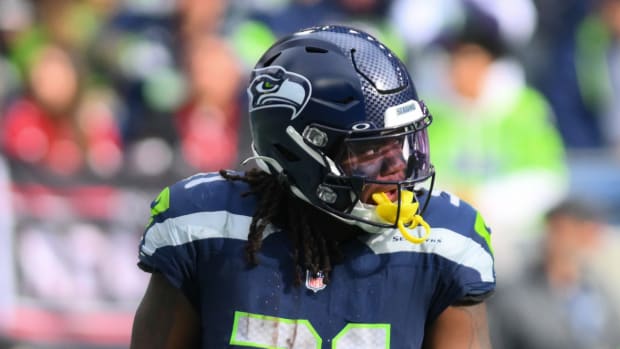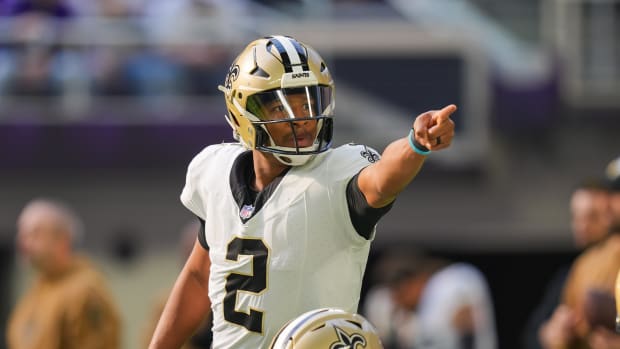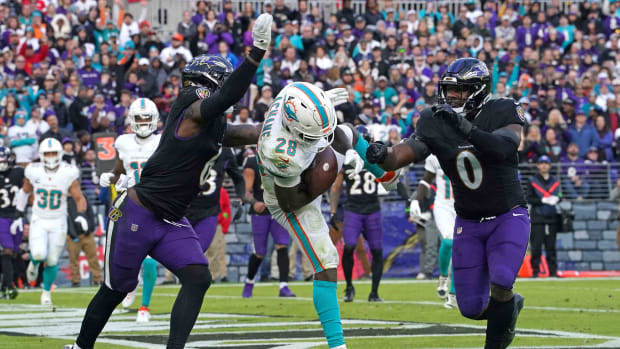How a book on stoicism became wildly popular at every level of the NFL
At the center of perhaps the most unlikely Venn Diagram ever drawn, an even more unlikely group of humans overlap. There’s a former governor/bodybuilder/actor (Arnold Schwarzenegger), a hip hop star (LL Cool J), an Irish tennis pro (James McGee), an NFL lineman (Garrett Gilkey, Bucs), a renowned sideline reporter (Michele Tafoya, NBC), an Olympian (cross-country skier Chandra Crawford), a performance coach (Andy McKay, Mariners), a baseball manager (Joe Maddon, Cubs) and a college basketball coach (Shaka Smart, Texas). That’s just to start.
No amount of pain can keep Cowboys TE Jason Witten from taking the field
They’re connected by a book, The Obstacle Is the Way, by Ryan Holiday. It’s a book they’ve digested, drawn inspiration from and applied to their careers. It’s a book about stoicism, the ancient Greek philosophy and its principles, and it has sold more than 100,000 copies, been translated into 17 languages and reverberated in one place not even Holiday expected it to—the wider world of sports. He describes that as a “happy accident.”
Why it happened is more complicated. The answer, at its most basic level, is this: Athletes and the people who coach them may be unfamiliar with stoicism, but they are stoics. They endure pain or hardship without feeling or complaint. They control what they can control. They talk ad nauseam about controlling only what they can control. They’re on to Cincinnati. They stay in the moment, and take things one game at a time. And by doing that, they are voicing a philosophy—living a philosophy, training under a philosophy—without knowing of or understanding it.
“Stoicism as a philosophy is really about the mental game,” Holiday said. “It’s not a set of ethics or principles. It’s a collection of spiritual exercises designed to help people through the difficulty of life. To focus on managing emotion; specifically, non-helpful emotion.”
The dude sounds like Bill Belichick.
Like Belichick, Holiday was drawn to history and strategy, to how governments worked and wars were won. Holiday studied philosophy, too, and read a million books, and then one day he went to a conference that featured Dr. Drew Pinsky, the internist of reality television fame. Holiday walked right up to Pinsky afterward and asked him for reading recommendations. Pinsky said he was reading about the stoics.
After career-threatening injury, Lockette wants to return to football
So Holiday read about them, too. He became obsessed with them. He repeated his favorite quote, from the Roman emperor Marcellus Aurelius, over and over. It reads: “The impediment to action advances action. What stands in the way becomes the way.” Eventually, Holiday decided to write his own book. He sold it in 2012, and it was released in May 2014.
***Brief interlude: before he became an author, Holiday trained under one, Robert Greene, who wrote 48 Laws of Power, a book that distills thousands of years of history into 48 explicated laws. Holiday worked for Greene as a research assistant. He saw that book sweep through another unlikely focus group—hip hop artists.
So Holiday’s book came out, and he received an email from McKay, then the Rockies’ performance coach. The first thing Holiday wondered was what a performance coach did in sports. McKay explained that many teams have mental, or performance, coaches, as do individual players. And this was the exact kind of stuff they were exploring—not how to hit better, or pitch better, but how to sleep better and travel better and recover better and think better. That made the connection between the book and the sports world clearer. “Leaders always want to be gravitating toward areas that have been ignored or taken for granted,” Holiday said. “I don’t think that’s in any way limited to sports, but it’s important there, the mental resilience. You almost wonder why sports didn’t come to that way of training first, before businesses and politicians.”
Soon after that encounter, Holiday heard from Michael Lombardi, a voracious reader who works as an assistant with the Patriots. Lombardi recommended the book throughout the league. He had Holiday send copies to his favorite team, the Saints.
The book does contain some sports examples. Holiday wrote about Nick Saban, the Alabama football coach, for instance, and his famous process, how he refused to be distracted by what might happen in the future, or what had happened in the past. He focused on the next game, the next day, the next hour. He didn’t get emotional, except in press conferences, when yelling at reporters. He focused on what mattered, what he could control.
That’s stoicism.
Nick Saban is a stoic.
Newton’s MVP performance vs. Saints helps Panthers remain undefeated
While Holiday wrote the book, he lived in New Orleans, where he was learning Brazilian jujitsu. He struggled with one particular move: how to escape from a mount. It seemed impossible at first, but he heard Saban in his brain. He focused on the steps involved, the same way an offensive lineman has steps he follows for every play. Handle one step, then the next step and—voila—he learned how to escape.
“Stoicism is the distinction between what you can control and what you can’t,” Holiday said. “That’s probably the hardest idea of pro sports—that you have to detach yourself from the results and focus exclusively on what you do and do it well. You can’t get mad about missing the shot, or losing a game, or calls that went against you. You have to focus on what you were supposed to do and whether you did it right.”
That’s why the book spread so far throughout the sports world. It applied, even, to the team that won the Super Bowl last February (the Patriots) and the team that lost it (the Seahawks). Those teams approach football in vastly different ways. Pete Carroll, the Seahawks’ coach, encourages his players to speak out and speak up, while Belichick preaches conformity; Carroll listens to hip hop and chews gum and preaches to his players; Belichick is so dour that he when he smiles, it’s news. But both center the way they coach on their approach and the consistency of whatever approach they use. In that way, they’re the same.
They’re both stoics.
The Seahawks, of course, won the Super Bowl the year before they lost it. They approached both off-seasons the same way, whether it was the fame-related distractions that came with the championship or the chemistry-related distractions that resulted from the way they lost it. Speaking of, Carroll called for a pass from the one-yard-line that was intercepted in the final minutes against New England, and his explanation has always been that he made the right decision, and that even though the “worst outcome” resulted, it wouldn’t change the process of the decision that he made, or how he makes decisions overall.
That’s stoicism.
Pete Carroll is a stoic.
So is his general manager, John Schneider. Lombardi recommended the book to Schneider when they ran into each other at Marcus Mariota’s pro day workout at Oregon last spring. Schneider didn’t just read the book, he gave copies to his entire personnel staff. He wanted them to read about Ulysses S. Grant and how a giant chandelier fell right next to him while he was having his picture taken and how he didn’t flinch. He wanted them to draw on the way Winston Churchill led.
Schneider told his personnel guys to keep the lessons they learned in mind when they scouted players. He saw life events those players overcame—knee injuries, suspensions, family issues—as positives, if they overcame them. “How they respond is important to us,” Schneider said. “It shows character.”
How they respond at the professional level is just as significant. Here are athletes who excelled their entire lives, who were stars in high school and stars in college, and they may not be stars in the NFL or the NBA. There will be obstacles, bad games, poor calls, slumps. This isn’t little league. There are no participation trophies, no pats on everyone’s backs. There is very public failure, and not just every game, but every quarter and every play.
“There’s a tendency now, especially in the U.S., to reward everything as a win,” says Tim Ferriss, an author and entrepreneur who distributed The Obstacle Is the Way as an audio book.
***Brief interlude: Holiday says almost without exception everyone in the sports world who loved his book said they listened to it, rather than read it.
“In sports, failure is the nature of the beast,” Ferriss continues. “It’s what separates the also-rans from champions, especially being able to come back from a mistake and be better rather than hesitant. For the best athletes, the obstacles shaped them. They have an operating system. They are resilient.”
Tafoya read the book after her producer recommended it, after Lombardi had recommended it to him. She resonated with an example about Amelia Earhart and how she accepted an offer that anyone would have considered insulting in order to be part of an important flight. “I love that attitude,” Tafoya said. “I consider myself a reporter’s reporter, not a woman who works in a male-dominated industry. The opportunity is what’s important.”
Michele Tafoya on working her 200th NFL game; Lorne Rubenstein, more
She continued: “You hear players say things like, let the game come to me, and stay within yourself, and as cliché as those things sound, they are rooted in this sort of stoicism, an ability to stay in the moment, rather than letting momentum carry over.”
She has read some of the book every week since she first picked it up.
Michele Tafoya is a stoic.
“Look, it applies,” Holiday said. “Stoicism is a set of 2,000-year-old principles adapted in some of the most difficult and trying experiences in history. Why would you not avail yourself to them? It doesn’t matter how hard it is to be in the Super Bowl. It’s probably not harder than becoming the emperor of Rome.”
Holiday does not plan on barnstorming athletic facilities across the country, giving speeches, relating stoicism to sports. He’ll talk to whoever asks, though. And he has his eye on one team in particular.
“I would love to work with my Saints,” he said. “They clearly need it.”






































